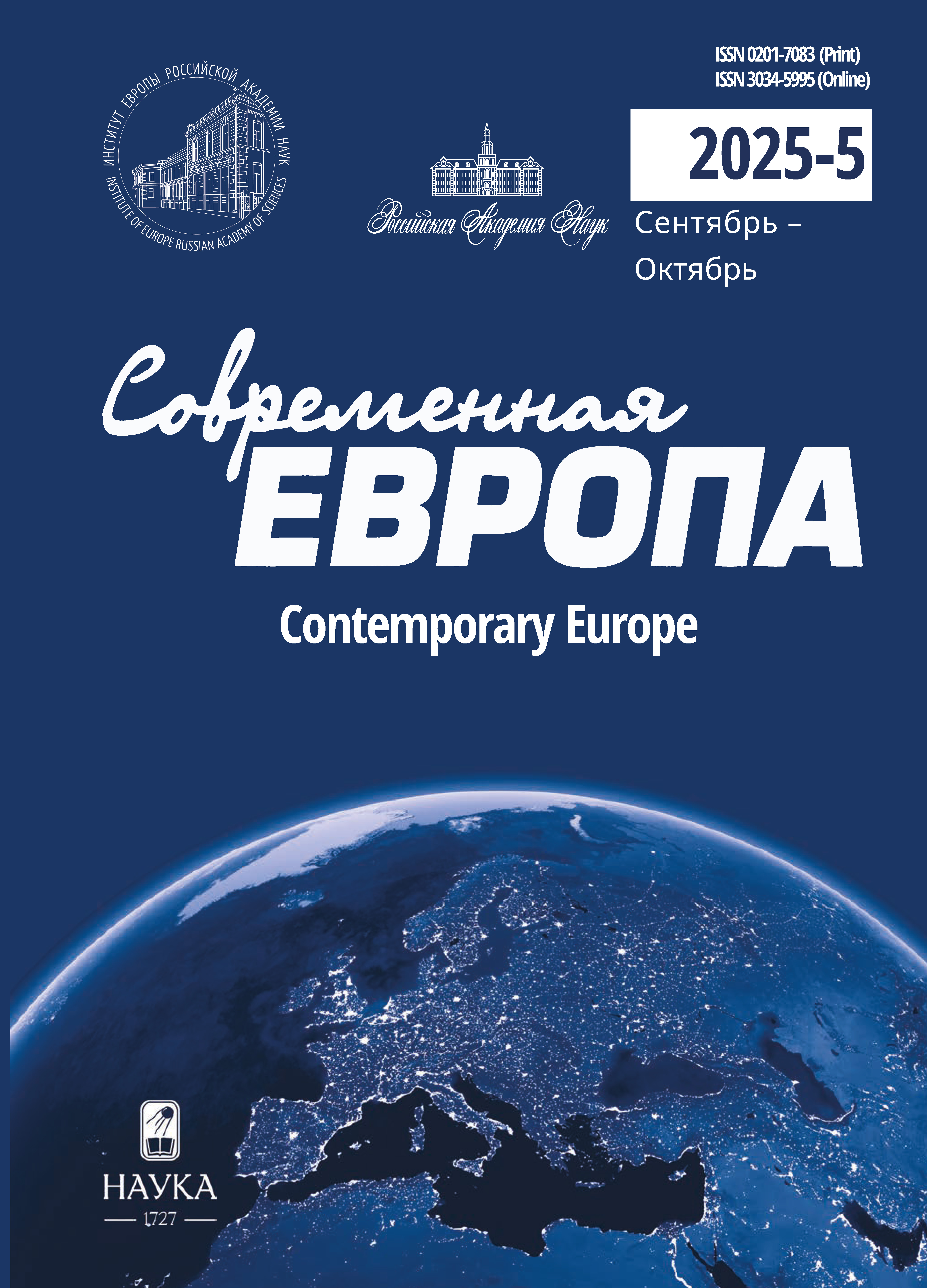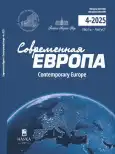ТРИ ФОРМЫ ДЕЛИБЕРАЦИИ В МОДЕЛЯХ СОВЕЩАТЕЛЬНОЙ ДЕМОКРАТИИ
- Авторы: Шавеко Н.А1
-
Учреждения:
- Институт философии и права Уральского отделения Российской академии наук, Удмуртский филиал
- Выпуск: № 4 (132) (2025)
- Страницы: 137-146
- Раздел: ЕВРОПЕЙСКИЙ ПРОЦЕСС: СТРАНЫ И РЕГИОНЫ
- URL: https://rjsvd.com/0201-7083/article/view/691005
- DOI: https://doi.org/10.31857/S0201708325040126
- ID: 691005
Цитировать
Полный текст
Аннотация
В статье рассмотрены теоретические модели совещательной демократии. Они противопоставлены демократическому элитизму и демократии участия. Кратко охарактеризованы особенности нормативной теории совещательной демократии. В ее рамках выделены три различные формы обсуждения (делиберации): микроформа, макроформа и рефлексивная форма. Микроформа предполагает обсуждение в специально сформированных небольших группах. Макроформа направлена на всенародное обсуждение социально значимых проблем. Рефлексивная форма предполагает, что подлинная демократия невозможна без рефлексии граждан над принимаемыми в публичном пространстве решениями. Разграничение микроформ и макроформ указывает на то, что модели совещательной демократии сохраняют связь с демократическим элитизмом и демократией участия, так как склоняются либо к первому, либо ко второй в оценке способностей и желания граждан участвовать в политике. Однако некоторые вариации микроформы и рефлексивная демократия радикально трансформируют демократический идеал, так как воля народа перестает играть определяющую роль. Сделан вывод, что демократическая теория на современном этапе претерпевает революционную трансформацию, так как демократия перестает ассоциироваться с волей народа.
Об авторах
Н. А Шавеко
Институт философии и права Уральского отделения Российской академии наук, Удмуртский филиал
Email: shavekonikolai@gmail.com
кандидат юридических наук, старший научный сотрудник Ижевск, Россия
Список литературы
- Ackerman B., Fishkin J. (2002) Deliberation day. Journal of Political Philosophy. No. 10(2). P. 129-152. DOI: https://doi.org/10.1111/1467-9760.00146
- Bächtiger A., Setälä M., Grönlund K. (2014) Towards a New Era of Deliberative Mini-Publics. Deliberative Mini-Publics: Involving Citizens in the Democratic Process. Ed. by A. Bächtiger, K. Gronlund, M. Setälä. ECPR Press, Colchester. UK. P. 225-246.
- Cohen J., Sabel Ch. (1997) Directly-Deliberative Polyarchy. European Law Journal. Vol. 3. No. 4. P. 313-342. DOI: https://doi.org/10.1111/1468-0386.00034
- Crosby N. (1999) Using the citizens' juries: a process for environmental decision making. Making better environmental decisions. Ed. by K. Sexton, A.A. Marcus, K.W. Easter, T.D. Burkhardt. Island Press, Washington, USA. P. 401-417.
- Dell'Aquila M., Grabova O., Heszterényi R., Mizsei B., Yu-Cheong Yeung T. (2024) Realising the democratic ideal: empowering marginalised voices in deliberative democracy. CEPS In-depth Analysis. 12.12. URL: https://www.ceps.eu/ceps-publications/realising-the-democratic-ideal-empowering-marginalised-voices-in-deliberative-democracy/ (дата обращения: 02.12.2024).
- Dienel P.C., Renn O. (1995) Planning cells: a gate to "fractal" mediation. Fairness and competence in citizen participation. Ed. by O. Renn, Th. Webler, P. Wiedemann. Springer, Dordrecht, Netherlands. P. 117-140. DOI: https://doi.org/10.1007/978-94-011-0131-8_6
- Dryzek J.S. (1990) Discursive Democracy: Politics, Policy, and Political Science. Cambridge University Press, Cambridge, UK. 254 p. DOI: https://doi.org/10.1017/9781139173810
- Fishkin J.S. (2009) When the People Speak. Deliberative Democracy and Public Consultation. Oxford University Press. 256 p. DOI: https://doi.org/10.1093/acprof:osobl/9780199604432.001.0001
- Goodin R.E. (2003) Reflective Democracy. Oxford University Press. 279 p. DOI: https://doi.org/10.1093/0199256179.001.0001
- Gutmann A., Thompson D. (2004) Why deliberative democracy? Princeton University Press. 232 p. DOI: https://doi.org/10.1515/9781400826339
- Habermas J. (1992) Faktizität und Geltung. Beiträge zur Diskurstheorie des Rechts und des demokratischen Rechtsstaats. Suhrkamp, Frankfurt a. M., Germany. 666 p.
- Hendriks C. (2002) Institutions of deliberative democratic processes and interest groups: roles, tensions and incentives. Australian Journal of Public Administration. No. 61(1). P. 64-75. DOI: https://doi.org/10.1111/1467-8500.00259
- Jacobs K. (2024) Have a Little Faith in Deliberation? Examining the Effect of Participation in a Citizens' Assembly on Populist Attitudes. Contemporary Politics. Vol. 30. No. 4. P. 512-533. DOI: https://doi.org/10.1080/13569775.2023.2296725
- Joss S., Durant J. (ed.) Public participation in science: the role of consensus conferences in Europe. NMSI Trading, London, UK. 144 p.
- Mutz D. (2006) Hearing the other side. Deliberative versus Participatory Democracy. Cambridge University Press. 184 p. DOI: https://doi.org/10.1017/cbo9780511617201
- Paulis E., Pilet J.-B., Panel S., Vittori D., Close C. (2021) The POLITICIZE dataset: an inventory of deliberative mini-publics (DMPs) in Europe. European Political Science. No. 20. P. 521-542. https://doi.org/10.1057/s41304-020-00284-9
- Paulis E., Pospieszna P. (2024) Deliberative mini-publics as learning schools for democracy? Examining deliberation impact on dissatisfied and radical participants of a citizens' assembly in Poland. Democratization. P. 1-24. DOI: https://doi.org/10.1080/13510347.2024.2422508
- Rawls J. (1997) The idea of public reason revisited. The University of Chicago Law Review. No. 94. P. 765-807. DOI: https://doi.org/10.2307/1600311
- Suteu S. (2019). The Populist Turn in Central and Eastern Europe: Is Deliberative Democracy Part of the Solution?. European Constitutional Law Review. Vol. 15. Issue 3. P. 488-518. DOI: https://doi.org/10.1017/S1574019619000348
- Uhr J. (1998) Deliberative democracy in Australia: the changing place of parliament. Cambridge University Press, Cambridge, UK. 265 p.
Дополнительные файлы











